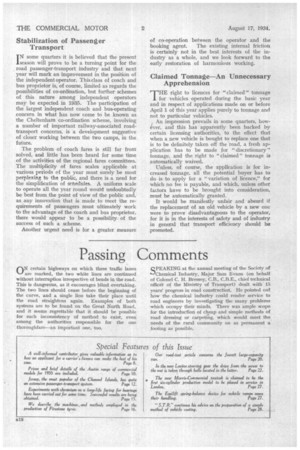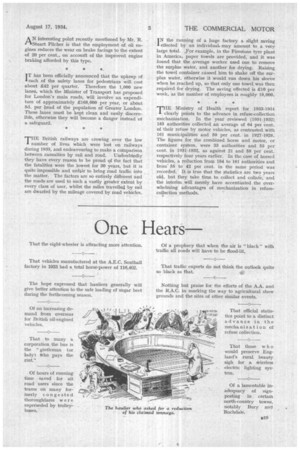Passing . Comments r - I N certain highways on which three traffic lanes
Page 32

Page 33

If you've noticed an error in this article please click here to report it so we can fix it.
are marked, the two white lines are continued without interruption irrespective of bends in the road. This is dangerous, as it encourages blind overtaking. The two lines should cease before the beginning of the curve, and a single line take their place until the road. straightens again. Examples of both systems are to be found on the Great North Road, and it seems regrettable that it should be possible for such inconsistency of method to exist, even among the authorities responsible for the one thoroughfare—an important one, too. SPEAKING at the annual meeting of the Society of Chemical Industry, Major Sam Evans (on behalf of Colonel C. H. Bressey, C.B., C.B.E., chief technical office-r of the Ministry of Transport) dealt with 15 years' progress in road construction. He pointed out how the chemical industry could render service to road engineers by investigating the many problems which occupy their minds. There was ample scope for the introduction of cheap and simple methods of road dressing or carpeting, which would meet the needs of the rural community on as permanent a footing as possible. AN interesting point recently mentioned by Mr. R. Stuart Filcher is that the employment of oil engines reduces the wear on brake facings to the extent of 20 per cent., on account of the improved engine braking afforded by this type.
I T has been officially announced that the upkeep of each of the safety lanes for pedestrians will cost about £42 per quarter. Therefore the 1,000 new lanes, which the Minister of Transport has proposed for London's main roads, will involve an expenditure of approximately £168,000 per year, or about 5d. per head of the population of Greater London. These lanes must be kept clean and easily discernible, otherwise they will become a danger instead ot a safeguard.
THE British railways are crowing over the low number of lives which were lost on railways during 1933, and endeavouring to make a comparison between casualties by rail and road. Undoubtedly they have every reason to be proud of the fact that the fatalities were the lowest for 30 years, but it is quite impossible and unfair to bring road traffic into the matter. The factors are so entirely different and the roads are used to such a vastly greater extent by every class of user, whilst the miles travelled by rail are dwarfed by the mileage covered by road vehicles.
I N the running of a huge factory a slight saving effected by an individuab may amount to a very large total. For example, in the Firestone tyre plant in America, paper towels are provided, and it was found that the average worker used one to remove the surplus water, and another for drying. Raising the towel container caused him to shake off the surplus water, otherwise it would run down his sleeve when he reached up, so that only one towel was then required for drying. The saving effected is £10 per week, as the number of employees is roughly 18,000.
THE Ministry of Health report for 1933-1934 clearly points to the advance in refuse-collection mechanization. In the 'year reviewed (1931-1932) 185 authorities collected an average of 64 per cent. of their refuse by motor vehicles, as contrasted with 161 municipalities and 50 per cent. in 1927-1928. The figures for the combined horse and motor, or container system, were 33 authorities and 53 per cent. in 1931-1932, as against 21 and 58 per cent. respectively four years earlier. In the case of horsed vehicles, a reduction from 184 to 161 authorities and from' 55 to 42 per cent, in the same period was recorded. It is true that the statistics are two years old, but they take time to collect and collate; and the interim will merely have accentuated the overwhelming advantages of mechanization in refusecollection methods.




























































































